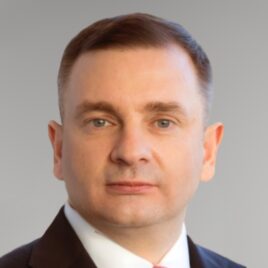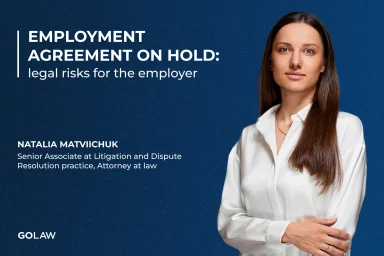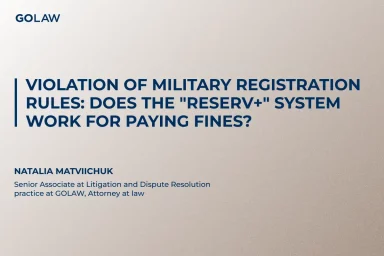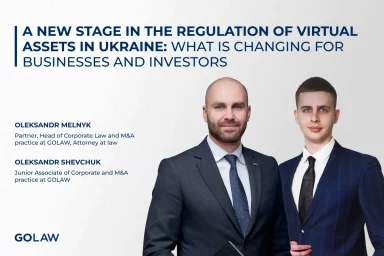The Ukrainian model of lobbying contains risks of legal uncertainty for public associations
Contents
The Law on Lobbying, which came into force on 14 March, will be enforced after the introduction of a Transparency Register, a key tool to ensure the work of the parties involved. One of them will definitely be public associations (PAs) whose content and forms of activity are closely intertwined with lobbying.
Common features
Thus, a public association is a voluntary association of individuals and/or legal entities under private law for the purpose of exercising and protecting rights and freedoms, satisfying public, in particular, economic, social, cultural, environmental and other interests. At the same time, lobbying entities (which can also be individuals and legal entities) influence lawmakers or initiators in the commercial interests of the beneficiary or in the person’s own commercial interests and relate to regulatory acts.
According to Art. 7 of the Law on Lobbying, lobbying methods include actions that influence the object of lobbying in relation to the subject of lobbying:
- any direct or indirect communication between entities;
- preparation and distribution of advertisements, proposals, program and position papers, analytical materials, results of sociological and other studies, including through the media or the Internet;
- participation in events;
- inviting the lobbying target to participate in meetings, conferences, events, etc;
- organisation of events (public events, information campaigns);
- other methods not prohibited by law.
These actions can also be called typical forms of activity of public associations, which, according to Article 21 of the Law “On Public Associations,” have the right to freely disseminate information and promote their goals, apply to state and local authorities, and their officials, participate in the development of draft legal acts (including as part of the implementation of state regulatory policy), hold meetings, etc.
Interestingly, public associations can engage in lobbying on preferential terms. After all, Article 9 of the Law on Lobbying explicitly provides for the status of lobbying entities for public associations. And they can lobby in the commercial interests of the beneficiary without entering into a lobbying agreement, unless otherwise provided for in their constituent documents.
Commercial interests and remuneration
However, the activities of public associations, other non-profit enterprises, institutions and organizations aimed at influencing (attempting to influence) public authorities in order to make or refrain from making decisions by such authorities are not lobbying in accordance with Article 3 of the Law on Lobbying. But here the law contains a reservation: “unless such activity relates to commercial interests”.
The Law on Lobbying also excludes the ordering or conducting of a public anti-corruption expert review of regulatory legal acts and their drafts in accordance with the Law on Prevention of Corruption, participation in public discussions of draft regulatory legal acts or public consultations on drafts, except when such participation is carried out by a lobbying entity in accordance with a lobbying services agreement.
Thus, it is the presence of commercial interests that fundamentally distinguishes lobbying and lobbying actors from “pure” activities of public associations.
By the way, the latter, if established as legal entities, are non-profit associations under the Law on Public Associations, whose main purpose is not to make a profit. Perhaps that is why the legal definition of lobbying is ambiguous in terms of describing lobbyist remuneration: it is an activity “for remuneration received directly or indirectly and/or with payment of actual expenses necessary for its implementation.”
This means that lobbying services can also be provided free of charge, including by public associations. This is also confirmed by the provision of Part 5 of Article 9 of the Law on Lobbying, which states that the price is an essential condition of a lobbying agreement only if it is compensated.
European benchmark
In this regard, PACE Recommendation No. 1908 (2010) of 26.04.2010 on Lobbying in a Democratic Society, which enshrines six principles of the European Code of Good Conduct on Lobbying, is very interesting. The first of them gives a clear definition of lobbying with a distinction between professionally paid activities and activities of civil society organizations, in particular, self-regulatory entities in various sectors of the economy. Unfortunately, our law does not have such clear regulations and distinctions.
Firstly, the principle of remuneration is actually leveled by the norm “for a fee… or with payment of actual expenses”. This means that travel, meals, and paper for materials expenses may be reimbursed, but not the intellectual work of the subject and the time spent on formulating a strategy for promoting interests, organising meetings with lobbying targets, etc. – these services of both public and professional organizations can be absolutely free.
Second, the list of activities that are not considered lobbying is rather ambiguous. Here, clause 9 of part 2 of Article 3 of the Law “On Lobbying” deserves special attention: personal (on behalf of oneself) representation of interests by an individual or legal entity in relations with state authorities, other state bodies, local self-government bodies, their officials, except when such representation is carried out by the lobbying entity and/or is carried out in the commercial interests of such person.
This wording does not take into account the situation when the experts of public associations are engaged, and which, while performing the terms of reference for analyzing a legal act, express not only their own position but also the position of the employer (public association). The experts will have a commercial interest while receiving remuneration from the PAs. However, this interest is not related to lobbying. Is it a commercial interest of the PA that engaged the expert to perform the tasks stipulated in the charter of the organization? No, since the PA does not make a profit.
However, PAs and independent experts engaged by them who criticise or propose to improve the legislation in some way (including based on the results of research, surveys, analytics, etc.) may find themselves in the field of lobbying regulation. Therefore, they, as lobbying entities, are obliged to register in the Transparency Register, submit additional reports on their activities, etc. Lobbying by a person who has not acquired the status of a lobbying entity gives grounds for the supervisory authority, which is the National Agency on Corruption Prevention, to bring such persons to justice.
Expressing opinions
This, in turn, creates risks for the functioning of public associations in terms of freedom of opinion and expression while implementing their statutory tasks. Anticipating the possibility of pressure, the Committee of Ministers of the Council of Europe in 2017 pointed out that the legal regulation of lobbying activities should not in any way or form violate the democratic right of individuals to freedom of expression, political activity, and participation in public life (see recommendations of 22.03.2017 CM/Rec(2017)2). Indeed, people may refrain from exercising their democratic right to express their opinions and participate in the political activities of the state due to fears that this is prohibited and punishable by law.
Thus, the broad discretion of the NACP, which arises from legal ambiguities in the law, may create conditions for potential pressure on PAs that may be perceived as disloyal. This may have implications for the freedom of expression, which is a European standard for lobbying and a constitutional guarantee enshrined in the Constitution.
If you need legal advice, please fill out the form below.

Dr. Valentyn Gvozdiy
Managing Partner, Attorney at law, PhD
- Contacts
- 31/33 Kniaziv Ostrozkykh St, Zorianyi Business Center, Kyiv, Ukraine, 01010
- v.gvozdiy@golaw.ua
- +38 044 581 1220
- Recognitions
- ITR World Tax 2025
- LEXOLOGY INDEX 2025
- The Legal 500 EMEA 2023
- Who’s Who Legal 2022
Sign up to be aware
New achievements are inspired by information. GO further, don’t miss out GOLAW news and legal alerts
Our expertise
-
- Energy and Natural Resources
- Antitrust and Competition
- Banking and Finance
- Compliance, Corporate Governance and Risk Management
- Corporate and M&A
- Criminal and White Collar Defence
- Defense in Anti-corruption procedures and regulations
- Labor and Employment
- Natural Resources and Environment
- Government Relations (GR)
- Insolvency and Corporate Recovery
- Intellectual property
- International trade
- Legal support of business and private Сlients in Germany
- Litigation and dispute resolution
- Private clients
- Real Estate and Construction
- Restructuring, Claims and Recoveries
- Martial Law
- Tax and Customs
-
- Agribusiness
- Aviation
- Chemical industry
- Engineering, Construction and Building Materials
- Natural Resources and Environment
- Financial institutions
- IT and AI
- Industry and manufacturing
- Healthcare industries, Life sciences and Pharmaceuticals
- Media, Entertainment, Sports and Gambling
- Retail, FMCG and E-Commerce
- Transport and Logistics
We use cookies to improve performance of our website and your user experience.
Cookies policy
Cookies settings







